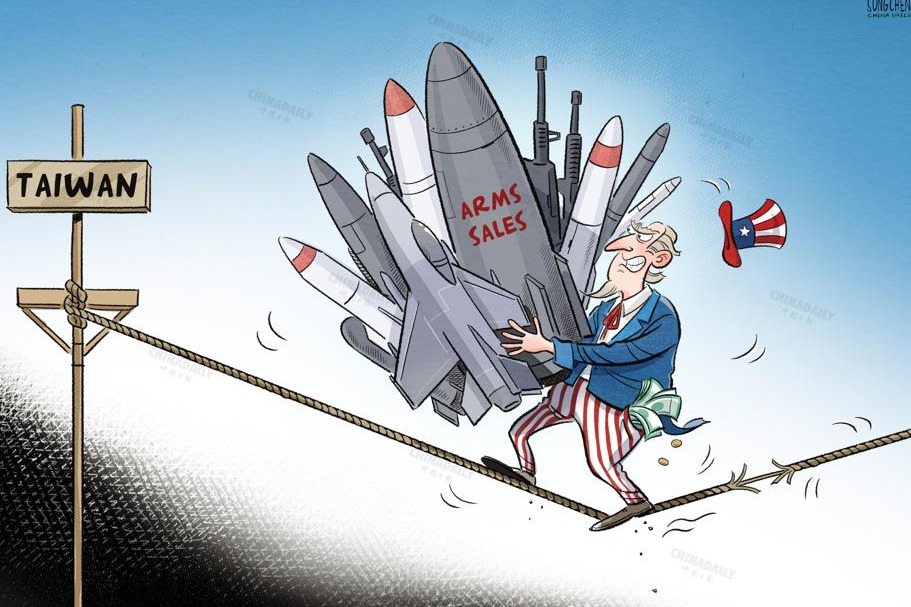Whither climate accord and global commitment?


Disappointment seems to have become the norm, rather than exception, of the UN Climate Change Conference, and Madrid has been no exception.
United Nations Secretary General Antonio Guterres said as much when he echoed the mood of many after the conclusion of the conference on Sunday: "I am disappointed with the results of COP25(25th Conference of Parties to the UN Framework Convention on Climate Change). The international community lost an important opportunity to show increased ambition on mitigation, adaptation and finance to tackle the climate crisis. But we must not give up, and I will not give up."
Indeed, "not give up" has to be the spirit with which we fight climate change. But it seems this spirit is exhibited only by those who want to save the planet and ensure a better future for the next generations, not by those who can actually make this happen.
That the longest-ever climate change conference in history could deliver possibly the lamest outcome, and that too after deleting almost everything the big countries were opposed to from the final draft and deferring probably all vital decisions, including the most important one-framing rules to establish a new carbon market under the Paris climate accord-speaks volumes of the mockery the rich countries have made of the fight against climate change.
Like Guterres, environmental activists and civil society groups, which for long have become major stakeholders in the climate talks, expressed their extreme disappointment mixed with anger at the results of the conference.
And for good reason, many civil society members and environmental activists blamed the United States for the weak outcome. The US withdrew from the Paris accord in June 2017 and will cease to be a delegate to the Conference of Parties to the UNFCCC from November 2020. Yet it continued to use the age-old tricks at Madrid to get its way. As ActionAid's global lead on climate change Harjeet Singh said, the US "came here in bad faith, acting only to protect" US companies' interests "and those of the polluting industries that caused climate emergency".
The effects of climate change were evident throughout the world this year, as they have been over the last few years, with increased ferocity.
Unprecedented heat waves, wildfires, droughts interspersed with unseasonal downpours and flash floods, devastating superstorms, violent snowstorms, melting glaciers and intense cold waves have been warning the world about what lies in store in the future. But big companies, even governments, instead of heeding this warning, continue business as usual, because that is the best way to make more money. What they tend, rather prefer, to forget is money can help address the problem of climate change, but it itself is not the solution to the problem.
The Madrid meeting was also expected to direct all economies to intensify their climate actions given that recent studies show the world has failed to do enough to prevent climate change from causing greater harm to the world.
Some countries, particularly small island states that are most vulnerable to climate change, demanded that all economies update their climate action plans by next year to reflect the new reality, saying the present sorry state of affairs was the result of developed economies not meeting their targets in the pre-2020 period.
But the final agreement only included a call seeking "the urgency of enhanced ambition" by all economies without any agreement on updating the developed economies' climate action plans by 2020.
Which means the next climate change conference faces the almost impossible task of completing all the unfinished work of the 2019 conference before the transition of the international climate regime from the 1997 Kyoto Protocol to the 2015 Paris Agreement. But since studies show the international community has to do much more than what the Paris accord mandates, economies have to increase their commitments, which is almost impossible given the present attitude of most of the economies.
The outcome of the conference in Madrid has put the UN system under extreme pressure. With the goal to keep the average global temperature rise to below 2 degrees Celsius from the pre-industrial level, the Madrid conference was scheduled to decide the extent to which the national pledges could be raised. But it failed to do so.
As long as development means continuous expansion of production and consumption, we cannot expect anything to change, because rising consumption doesn't mean ensuring the well-being of the people but pampering to the greed of the haves.
Unless there is a paradigm shift in the definition and execution of economic development, we cannot tackle climate change in the true sense.
And as Guterres warned in Madrid on Thursday, failure to tackle climate change could result in economic disaster, and unrestrained climate change would allow only the "survival of the richest".
The fact that Guterres was forced to say what the rest of the world has known for years shows that we indeed are facing a bleak future.
The author is a senior editor with China Daily.


































